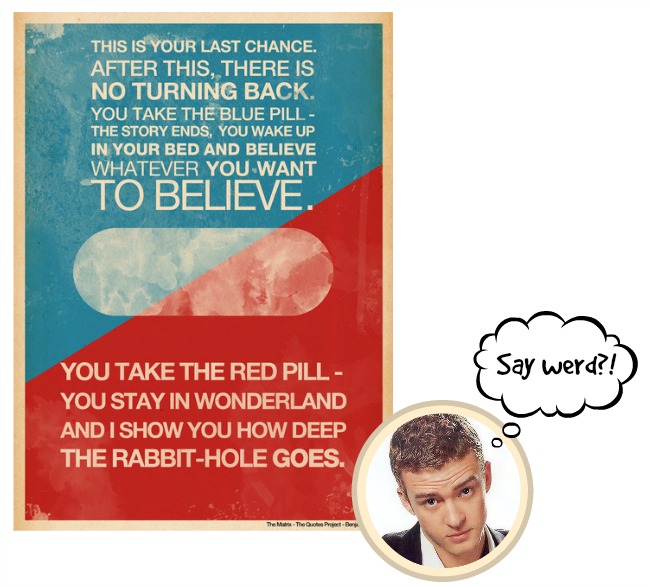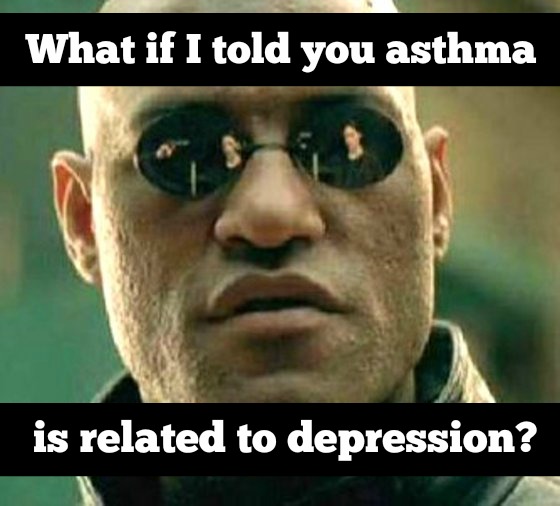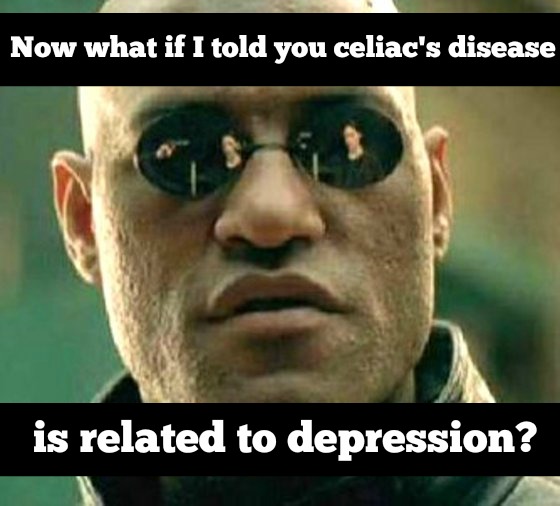Just when you thought science couldn’t get any sexier, the cool kids go and start talking about microscopic organisms living in your gut.
(I know – it’s like, did someone just turn on Nelly, or is it getting hot in here??)
First tryptophan and 5-HT biosynthesis, now bidirectional signaling between endosymbionts and the brain?
Oh, consider it brought, J.T. Consider it brought.
(No, for real, is anyone still reading this?)
Ok, so maybe reading about gut bacteria isn’t exactly how you envisioned the next ten minutes of your life playing out. (If it is, then that is really strange. And kinda creepy.) But seriously, just hang in there, because I promise this whole thing gets like Matrix-level crazy.
 (Kinda like those weird people who woke up this morning wanting to read about gut bacteria).
(Kinda like those weird people who woke up this morning wanting to read about gut bacteria).
Let’s get the gross stuff out of the way
There’s no easy way to say this, so I’m just gonna throw it out there: Basically, it turns out our bodies are home to nearly 100 trillion bacteria, including over 1,000 different species – whose collective genome contains at least 100 times as many genes as our own.
(I know. Not exactly the plot twist I was hoping for either.)
The bacteria that make up our gut microbiota alone far out number the total amount of eukaryotic cells in our body. (Think of a “microbiota” as a little bacteria universe and “eukaryotic cells” as the cells that make us human.) Translation?
There’s a lot more of them than us.
The good news is: most of these little endosymbionts seem to be on our side.
 They pitch in with metabolizing complex lipids and polysaccharides (super important to immune system development), neutralizing carcinogens, protecting against pathogens, modulating intestinal motility… you get the drift.
They pitch in with metabolizing complex lipids and polysaccharides (super important to immune system development), neutralizing carcinogens, protecting against pathogens, modulating intestinal motility… you get the drift.
(Apparently, this staying alive business takes a village.)
Research is just getting started, but it looks like there are certain bacterial populations that are common among different groups of humans. The rest of our endosymbiont friends seem pretty variable; they’re influenced by a number of factors, including genetics, diet, metabolism, age, geography, antibiotic treatment and stress – making each individual’s microbiota completely unique (and potentially useful for understanding differences in disease development and treatment response).
Ok, so here’s where we enter the Matrix…
(Important puzzle pieces in bold.)
Scientists have known for a while that the brain and gut microbiota communicate – they just always kinda figured the brain was in charge. But as Drs. Jane Foster and Karen-Anne McVey Neufeld observed in their 2013 Trends in Neuroscience review, “Neuroscientists are now taking notice of novel reports that highlight the ‘bottom-up’ influence of microbes themselves.”
 See, scientists knew that stressful situations could trigger our hypothalamic-pituitary-adrenal (HPA) axis (#TeamBrain) to alter gastrointestinal motility, secretions and blood flow – which then gets communicated back to the brain and can result in feelings of nausea and pain. (Plus we already knew that stress – and other factors – shape how our lil bacteria buddies develop.) So we knew that when it came to stress, the brain could influence the gut, setting in motion a domino-effect of activity.
See, scientists knew that stressful situations could trigger our hypothalamic-pituitary-adrenal (HPA) axis (#TeamBrain) to alter gastrointestinal motility, secretions and blood flow – which then gets communicated back to the brain and can result in feelings of nausea and pain. (Plus we already knew that stress – and other factors – shape how our lil bacteria buddies develop.) So we knew that when it came to stress, the brain could influence the gut, setting in motion a domino-effect of activity.
But in 2004, a group of researchers (big ups to Sudo, Chida, Aiba, Sonoda, Oyama, Yu, Kubo & Koga!) decided to test the theory that the brain-gut axis was a two-way street, by manipulating the microbiota makeup of mice to see if microbes could affect the development of neural systems that control the body’s response to stress. (Your endocrine glands – influenced by the HPA axis – secrete hormones, such as cortisol and adrenaline, when you get stressed out. This study was the first to suggest that our lil endosymbiont buddies might play a part in that process.)
Previous studies had shown that the HPA axis is heavily influenced by early postnatal experiences (for instance, animals that are handled a lot as babies tend to have milder responses to stress as adults; animals that are exposed to repeated periods of maternal deprivation tend to wig out).
Well, Sudo and crew got to thinking: If microorganisms colonize in our bodies during early postnatal life (#ew) and we know they impact our immune system… and we know the immune system talks a lot with the nervous system… and the HPA axis is also programmed during early postnatal life… maybe there’s some kind of common denominator – and maybe it’s our gut microbiota.
And guess what: They were right! The study’s germ-free mice (who had no microbiota) exhibited an under-developed immune system and exaggerated response to restraint stress! And get this: adding back in bacteria at least partially reversed the effects – leading Sudo et al. to suggest, “that either a complete indigenous microbiota containing aerobic and anaerobic bacteria or some strains of anaerobic bacteria including Bifidobacterium may play a protective role against the deleterious effects of elevated plasma glucocorticoid levels”!!!
(Sorry, dorked out there for a minute.)
Perhaps most importantly, Sudo’s study planted the seed that early infection with pathological bacteria may alter the development of the neural systems that govern our body’s endocrine response to stress (a.k.a. all those little hormones your body releases when you’re under pressure), predisposing individuals to stress-related pathology later in life (a.k.a. anxiety and mood disorders).
And let’s not forget our endosymbiont friends are shaped by a number of factors including – yep, you guessed it: Food.
Feel like your brain’s gonna explode yet?
#TeamWonderland #Always
Ok, so clinically depressive symptoms are associated with a dysregulation of the HPA axis and we’ve just established that there’s a direct link between microbiota and HPA reactivity. (Look how far down the rabbit hole we’ve already fallen – that sentence actually makes sense, right?!)
Not to mention – in addition to influencing HPA axis development early in life – recent studies (1, 2) have shown that microbiota may also directly influence central nervous system (CNS) function by activating stress circuits.
Plus there’s all this other random stuff to take into consideration, like for instance: Stress is known to increase intestinal permeability – which would give bacteria the opportunity to move across the lining of our gastrointestinal tract (if they wanted to) and directly access both immune and neuronal cells in the enteric nervous system (ENS) (a.k.a, the gastrointestinal tract’s nervous system). This, as Foster and McVey Neufeld point out, suggests a potential pathway whereby microbiota could influence CNS function via the immune system and ENS in the presence of stress.
There was also a wild study published by those crazy kids over at Psychoneuroendocrinology that showed that pretreating rats with a probiotic (science slang for “good microorganisms”) reduced the intestinal permeability that is usually caused by stress and also prevented associated HPA hyper-reactivity. (We’ll dig into the influence of probiotics on anxiety and depressive-like behaviors another day, promise! #MarkYourCalendars)
Anyways, long story short: Your gut bacteria is 100% linked to the part of your brain that affects depression and anxiety. No questions asked.
Dude, this is the deepest rabbit hole ever
Does anyone remember that post I wrote in 2012, Asthma and Depression: What Causes What?
(It’s ok, no hurt feelings. #haters)
In that post, I cited an International Journal of Epidemiology study (I know, I bet you’re really wishing you would’ve read it now), claiming that people with asthma were twice as likely to suffer from depression than people without. (The study included 245,727 participants across 57 countries, so the results seem pretty legit.) No one could figure out why, but the existence of a universal phenomenon was confirmed.
(Alright, now put that on the back burner for a sec and let’s switch over to some more bacteria talk.)
Helicobactor pylori is one of the most hated microbes in the world. (No citation on that one, just take my word for it.) H. pylori (as it’s known in the streets) causes gastritis and peptic ulcers and is highly correlated with gastrointestinal-related cancers. Today, antibiotic treatment has reduced and almost totally eliminated H. pylori from the gut of many humans (which you would think would be a good thing). However, something strange has started to happen:
While H. pylori infection rates have dropped in many parts of the Western world from more than 50% at the beginning of the 20th century to less than 10% at its end, the incidence of many immune disorders (such as eczema and asthma – told ya we’d come back for it! – as well as auto-immune diseases including multiple sclerosis, type I diabetes and chronic inflammatory conditions such as inflammatory bowel disease) have increased at an alarming rate.
Now, it’s worth noting that the asthma-depression link has been observed worldwide – including countries that aren’t too big on antibiotics. So any theory implicating microbiota in the relationship between asthma and depression would have to work through a few kinks. But I mean, still…
Crazy coincidence, right?
This crazy train just keeps on rollin.
Gastrointestinal (GI) distress has long been linked to psychological disturbance. For instance, a 1998 study of 92 celiac disease patients found that approximately one-third suffer from depression. (This particular connection – between celiac disease and depression – is currently attributed to a reduced intestinal absorptive surface which prevents patients from absorbing critical nutrients.)
However, studies (1, 2) have shown that in experiments resulting in increased GI inflammation, there are notable increases in anxiety-like behavior – and treatment with a probiotic calms them down. So it kinda makes you wonder (and this is just me talking, no studies to back this up or anything): But what if all of the GI inflammation caused by celiac’s disease influences the development of depression through both a reduced ability to absorb nutrients and the crazy stuff that happens when our body’s bacteria gets mad?
 If probiotic treatment reduces anxiety-like behavior caused by GI inflammation in other studies, would it reduce depression symptoms in patients suffering from celiac’s disease as well?
If probiotic treatment reduces anxiety-like behavior caused by GI inflammation in other studies, would it reduce depression symptoms in patients suffering from celiac’s disease as well?
I see a light! We’re getting closer!
So it’s no secret that our nation’s obesity epidemic and mental health crisis have grown hand-in-hand. (According to the National Institute of Mental Health, 40 million Americans over the age of 18 suffer from an anxiety disorder in a given year; 14.8 million suffer from depression. The Centers for Disease Control and Prevention claim that 69% of U.S. adults over 20 are overweight and/or obese.)
The big mystery, though, has been why. However, it looks like all of this gut microbiota talk could hold the answer.
Think about it:
- Depression and anxiety are associated with a dysregulation of the HPA axis
- There’s a direct link between gut microbiota and HPA reactivity
- Gut microbiota is shaped by a number of factors including diet, metabolism, antibiotic treatment and stress
- Antibiotic use is on the rise, stress is out of control and the average diet consists of an increasing amount of genetically-modified and sugar-enriched foods (we didn’t really touch on this part, but you guys know our ancestors didn’t grow up eating Cheeto’s)
So, doesn’t it make sense that what we’re eating may be shaping our gut bacteria in a way that triggers an effect on our HPA axis which then results in symptoms of anxiety and depression?
And wouldn’t that explain the strangely coincidental, simultaneous rise of a national obesity epidemic and mental health crisis?
Whew!
Now, there’s a ton of other factors at play (even within that little theory I just described), but if nothing else, I feel like this line of thinking definitely presents a solid platform for future research!
(Which is exactly what all of the neuroscientists who read my blog will think, right after they scroll past all those pictures of Justin Timberlake, Keanu Reeves and Laurence Fishburne ;) lol)
Happy Birthday, Chet!
In totally non-science-related news, my brother, Chet, just turned 28! I was hoping to publish this post on his real birthday (a few days ago) because I actually published my first article on the gut-brain axis on his birthday two years ago (don’t you wish I was your sister, too?).
And that’s a wrap!
Thanks so much to anyone who stuck around til the end!! (Heck, you get points for just scrolling through the pictures on this one – I think this is our longest post to date!)
If you have any thoughts or questions, please feel free to hit up the comment section. And if you haven’t already, please check out my lil Indiegogo video – every little bit helps! ♥
(I don’t have Facebook, so if you learned anything from today’s post, ‘likes’ or ‘shares’ are always appreciated ♥)
PS. Talk about sexy! Take a look at that resource list ;)
(ok. it’s official. i’m a nerd lol) ♥
Resources
Ait-Belgnaoui, A., Durand, H., Cartier, C., Chaumaz, G., Eutamene, H., Ferrier, L., Houdeau, E., Fioramonti, J., Bueno, L. & Theodorou, V. (November 2012). Prevention of gut leakiness by a probiotic treatment leads to attenuated HPA response to an acute psychological stress in rats. Psychoneuroendocrinology, 37(11), pp. 1885-95, doi: 10.1016/j.psyneuen.2012.03.024
Arumugam, M., Raes, J., Pelletier, E., Le Paslier, D., Yamada, T., Mende, D.R., et al. (May 2011). Enterotypes of the human gut microbiome. Nature, 473(7346), pp. 174-80. DOI:10.1038/nature09944
Bach, J.F. (September 2002). The effect of infections on susceptibility to autoimmune and allergic diseases. New England Journal of Medicine, 347, pp. 911-20. DOI: 10.1056/NEJMra020100.
Bercik, P., Park, A.J., Sinclair, D., Khoshdel, A., Lu, J., Huang, X., Deng, Y., Blennerhassett, P.A., Fahnestock, M., Moine, D., Berger, B., Huizinga, J.D., Kunze, W., McLean, P.G., Bergonzelli, G.E., Collins, S.M., Verdu, E.F. (December 2011). The anxiolytic effect of Bifidobacterium longum NCC3001 involves vagal pathways for gut-brain communication. Neurogastroenterology and Motility: The Official Journal of the European Gastrointestinal Motility Society, 23(12), pp. 1132-9. DOI: 10.1111/j.1365-2982.2011.01796.x
Bercik, P., Verdu, E.F., Foster, J.A., Macri, J., Potter, M., Huang, X., Malinowski, P., Jackson, W., Blennerhassett, P., Neufeld, K.A., Lu, J., Khan, W.I., Corthesy-Theulaz, I., Cherbut, C., Bergonzelli, G.E. & Collins, S.M. (December 2010). Chronic gastrointestinal inflammation induces anxiety-like behavior and alters central nervous system biochemistry in mice. Gastroenterology, 139(6), pp. 2102-2112. DOI: 10.1053/j.gastro.2010.06.063
Blaser, M.J. Falkow, S. (December 2009). What are the consequences of the disappearing human microbiota? Nature Reviews: Microbiology, 7(12), pp. 887–94. DOI: 10.1038/nrmicro2245.
Centers for Disease Control and Prevention. (2014). Obesity and Overweight. National Center for Health Statistics. Retrieved: July 20, 2014.
Ciacci, C., Iavarone, A., Mazzacca, G. & De Rosa, A. (March 1998). Depressive symptoms in adult celiac disease. Scandinavian Journal of Gastroenterology, 33(3), pp. 247-50.
Drossman, D.A. (May-June 1998). Presidential address: Gastrointestinal illness and the biopsychosocial model. Psychosomatic Medicine, 60(3), pp. 258-67.
Foster, J.A. & McVey Neufeld, K-A. (May 2013). Gut-brain axis: how the microbiome influences anxiety and depression. Trends in Neurosciences, 36(5), pp. 305-312. DOI: 10.1016/j.tins.2013.01.005
Gill, S.R., Pop, M., DeBoy, R.T., Eckburg, P.B., Turnbaugh, P.J., Samuel, B.S., Gordon, J.I., Relman, D.A., Fraser-Liggett1, C.M. & Nelson, K.E. (June 2006). Metagenomic Analysis of the Human Distal Gut Microbiome. Science, 312(5778), pp. 1355-1359. DOI: 10.1126/science.1124234
Goehler, L.E., Park, S.M., Opitz, N., Lyte, M. & Gaykema, R.P. (March 2008). Campylobacter jejuni infection increases anxiety-like behavior in the holeboard: possible anatomical substrates for viscerosensory modulation of exploratory behavior. Brain, Behavior, and Immunity, 22(3), pp. 354-66.
Loerbroks, A., Herr, R.M., Subramanian, S.V. & Bosch, J.A. (2012). The association of asthma and wheezing with major depressive episodes: an analysis of 245,727 women and men from 57 countries. International Journal of Epidemiology, 41(5), pp. 1436-1444. DOI: 10.1093/ije/dys123
Lyte, M., Li, W., Opitz, N., Gaykema, R.P. & Goehler, L.E. (October 2006). Induction of anxiety-like behavior in mice during the initial stages of infection with the agent of murine colonic hyperplasia Citrobacter rodentium. Physiology and Behavior, 89(3), pp. 350-7.
Meaney, M.J., Aitken, D.H., Bhatnagar, S. & Sapolsky, R.M. (1991). Postnatal handling attenuates certain neuroendocrine, anatomical, and cognitive dysfunctions associated with aging in female rats. Neurobiology of Aging, 12(1), pp. 31-38.
Montiel-Castro, A.J., González-Cervantes, R.M., Bravo-Ruiseco, G. and Pacheco-López, G. (October 2013). The microbiota-gut-brain axis: neurobehavioral correlates, health and sociality. Frontiers in Integrative Neuroscience, 7(10). Doi: 10.3389/fnint.2013.00070
National Institutes of Health Human Microbiome Consortium. (January 2008). Human Microbiome Project Reference Genomes. Retrieved: October 11, 2014.
National Institutes of Health. The Numbers Count: Mental Disorders in America. National Institute of Mental Health. Retrieved: July 20, 2014.
Relman D. A. (2012). The human microbiome: ecosystem resilience and health. Nutrition Reviews, 70(Supplement 1), pp. S2–S9. DOI: 10.1111/j.1753-4887.2012.00489.x
Rosenberg, M. (March 4, 2014). The surprising reason why Americans might be obese, anxious and depressed. AlterNet. Retrieved: September 29, 2014.
Schmidt, M.V., Oitzl, M.S., Levine, S. & de Kloet, E.R. (November 2002). The HPA system during the postnatal development of CD1 mice and the effects of maternal deprivation. Brain Research: Developmental Brain Research, 139(1), pp. 39-49.
Sudo, N., Chida, Y., Aiba, Y., Sonoda, J., Oyama, N., Yu, X.N., Kubo, C. & Koga, Y. (July 2004). Postnatal microbial colonization programs the hypothalamic-pituitary-adrenal system for stress response in mice. The Journal of Physiology, 558(Pt. 1), pp. 263-275.












Not only did I read it all twice….I understood most of it!!!! Shocked, since I am SOOOOO not a science guy. Your willingness to sift through large amounts of research to bring significant information to those like myself is nothing short of Outstanding.!!!! And, yes, I too see the brother/ justin resemblance:)
Spoken like a true mom lol ;) Thanks, love you! xo
DUDE! The fact that Chet looks like JT just blew my mind way more then the gut thing! Love
Right?!?
Thanks for bringing this important issue to most of us, people without the scientific background necessary to catch on the fine details behind this complex interaction. I became a celiac victime in my thirties, and I was exposed to the medical ignorance about the greatness of antibiotics to fight virus colds…stupids! It was the late 50s and early 60s and we still watch “doctors” prescribing it to defenseless kids to “treat” virus influenza. Thanks again.
Hi, Miguel – so glad you enjoyed it! Sorry to hear about your struggles with celiac disease (hope things are going well for you now!).
All the best, Jessica :)